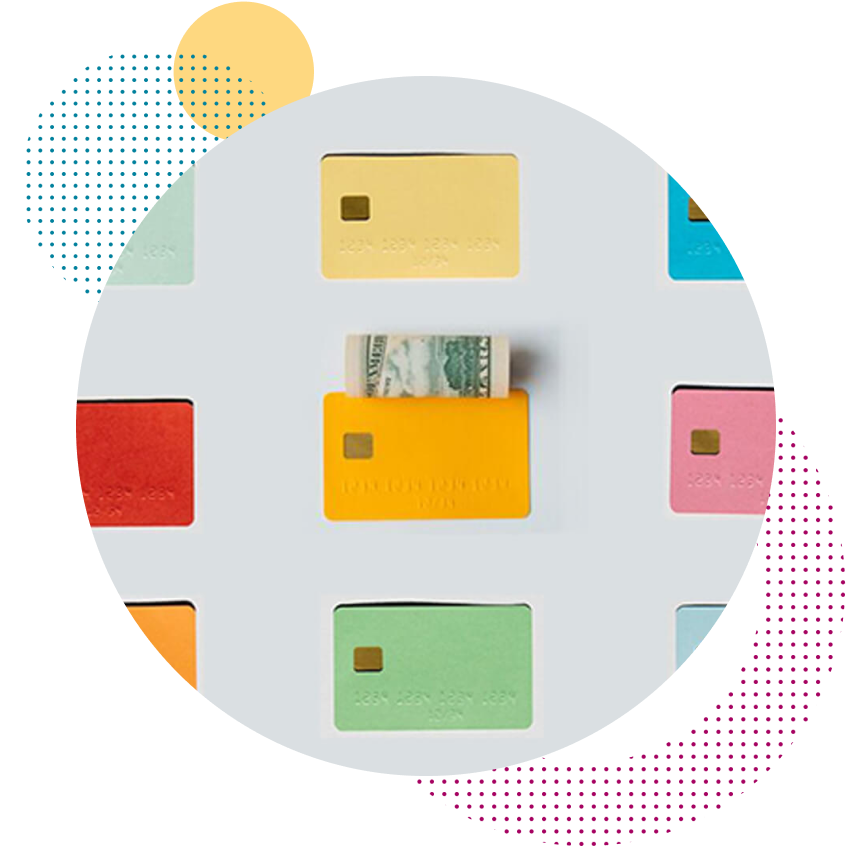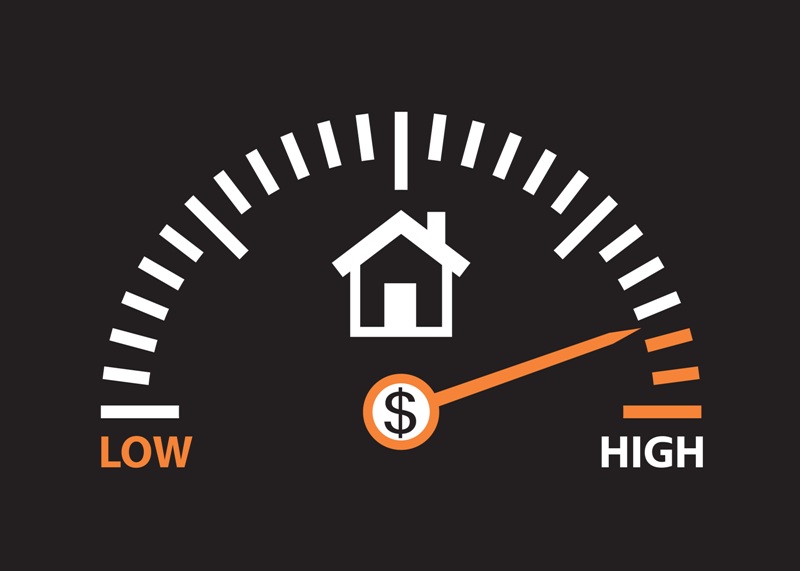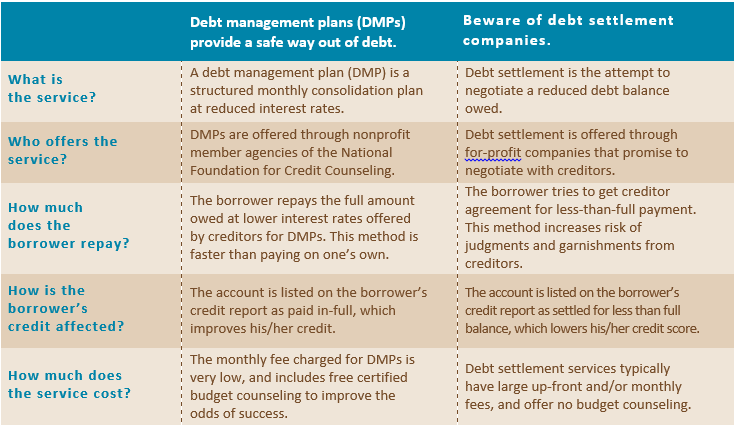
Consolidating your debt can help you manage it. You can also reduce the amount of your debt. It can also improve your payment history. You can even improve credit scores if this strategy is used correctly. In some cases, lenders will even allow you to consolidate your credit cards. You won't be tempted to spend your credit cards on things you don’t need.
Costs
Consolidating debt can be very expensive. It can offer temporary financial relief. It does not always solve the root problem. In fact, you may end up in more debt before you can pay off the consolidation loan. It is crucial to compare the costs and benefits of debt consolidation companies before you sign any agreements.
In most cases, the interest rates that will be charged to consolidate your debts can be higher then your original debt. Additionally, your credit score may be affected by the consolidation. It's a good idea to monitor your credit score before signing up for any consolidation plan to ensure that you get the best rates possible.
Fees
Debt consolidation helps consumers with high debt to make one payment each month instead of several. It can also lower interest rates and lower monthly payments. The best way to use debt consolidation is if you have good credit and are willing to pay off your debts in a short period of time. A balance transfer or personal loan is a good option if you don’t have the funds to pay all your debts. These programs send payment to your creditors, which can help you save on interest.

Consolidating your debt will improve your payment history which is good for credit. While you may find that it's easier to make payments after consolidating, it's important to make sure you're not missing any. You can seriously damage your credit score if you miss any payments. Fortunately, there are many free tools available to help you improve your credit score. WalletHub, for instance, offers a free credit score as well as daily progress tracking. They also offer personalized advice on improving your score.
Credit score impact
Consolidating your debt can have many benefits. It can also help you save money. Consolidating debt can also increase your credit score. FICO scores can be calculated using several factors. These factors include the length and history of credit you have, how often you pay your bills, and how much money you owe. Your score will go up the longer you've been credit-worthy.
There are mixed results when it comes to consolidating debt. You may see some negative effects on your credit score immediately, but others will have a positive impact over the long and medium term. The specific impact of debt consolidation on your credit score will depend on your individual situation and how you manage your debt afterward.
Other ways to consolidate debt
You can consolidate your debt in other ways that won't harm credit. For example, you could use a debt management program. A debt consolidation program is a great option to reduce monthly payments and better manage your finances. Before you make a decision on a consolidation program, be sure to consider all the pros and con's. For example, you may want to consider debt consolidation if you have multiple credit cards with high interest rates, or if you need to pay off multiple loans with one monthly payment.
Consolidating loans for debt allow you refinance multiple loans to one lender. HELOCs, which are home equity loans, can be used for this purpose by some consumers. The process is the same, except you will need comparisons of interest rates, to pay off your existing loans, and to make monthly payments towards your new loan.

Credit utilization ratio: Impact
It doesn't matter if you are looking at debt consolidation. Understanding the impact of high credit utilization on your credit score is crucial. Your credit score is an important determinant of financial health. It can greatly impact your chances of getting a loan. For best results, aim to use no more than 30% of your available credit on revolving accounts. Be sure to pay your monthly balances.
Consolidating your debt can reduce your credit utilization ratio, and make it easier to manage your debt. These impacts may not last long and could negatively impact your credit score. Your credit score can be improved by using it responsibly.
FAQ
What is the limit of debt?
It is important to remember that too much money can be dangerous. You will eventually run out money if you spend more than your income. Because savings take time to grow, it is best to limit your spending. Spend less if you're running low on cash.
But how much do you consider too much? There is no universal number. However, the rule of thumb is that you should live within 10%. You won't run out of money even after years spent saving.
This means that if you make $10,000 yearly, you shouldn't spend more than $1,000 monthly. If you make $20,000 per year, you shouldn't spend more then $2,000 each month. Spend no more than $5,000 a month if you have $50,000.
The key here is to pay off debts as quickly as possible. This includes credit card bills, student loans, car payments, etc. Once these are paid off, you'll still have some money left to save.
It would be best if you also considered whether or not you want to invest any of your surplus income. If you choose to invest your money in bonds or stocks, you may lose it if the stock exchange falls. You can still expect interest to accrue if your money is saved.
For example, let's say you set aside $100 weekly for savings. It would add up towards $500 over five-years. Over six years, that would amount to $1,000. You'd have almost $3,000 in savings by the end of eight years. It would take you close to $13,000 to save by the time that you reach ten.
You'll have almost $40,000 sitting in your savings account at the end of fifteen years. It's impressive. However, if you had invested that same amount in the stock market during the same period, you'd have earned interest on your money along the way. Instead of $40,000, your net worth would be more than $57,000.
You need to be able to manage your finances well. If you don't, you could end up with much more money that you had planned.
What side hustles can you make the most money?
A side hustle is an industry term for any additional income streams that supplement your main source of revenue.
Side hustles can be very beneficial because they allow you to make extra money and provide fun activities.
In addition, side hustles also help you save more money for retirement, give you time flexibility, and may even increase your earning potential.
There are two types side hustles: active and passive. Online businesses like e-commerce, blogging, and freelance work are all passive side hustles. You can also do side hustles like tutoring and dog walking.
The best side hustles make sense for you and fit well within your lifestyle. Consider starting a business in fitness if your passion is working out. You might consider working as a freelance landscaper if you love spending time outdoors.
Side hustles can be found everywhere. Side hustles can be found anywhere.
For example, if you have experience in graphic design, why not open your own graphic design studio? Perhaps you're an experienced writer so why not go ghostwriting?
Whatever side hustle you choose, be sure to do thorough research and planning ahead of time. This way, when the opportunity arises, you'll be ready to jump right in and take advantage of it.
Remember, side hustles aren't just about making money. Side hustles are about creating wealth and freedom.
And with so many ways to earn money today, there's no excuse to start one!
Why is personal finance important?
Anyone who is serious about financial success must be able to manage their finances. We live in a world with tight finances and must make tough decisions about how we spend our hard earned cash.
So why should we wait to save money? Is there nothing better to spend our time and energy on?
Yes, and no. Yes because most people feel guilty about saving money. No, because the more money you earn, the more opportunities you have to invest.
Spending your money wisely will be possible as long as you remain focused on the larger picture.
To become financially successful, you need to learn to control your emotions. Negative thoughts will keep you from having positive thoughts.
Unrealistic expectations may also be a factor in how much you will end up with. This is because you haven't learned how to manage your finances properly.
Once you've mastered these skills, you'll be ready to tackle the next step - learning how to budget.
Budgeting refers to the practice of setting aside a portion each month for future expenses. Planning will save you money and help you pay for your bills.
So now that you know how to allocate your resources effectively, you can begin to look forward to a brighter financial future.
Which passive income is easiest?
There are many online ways to make money. Most of them take more time and effort than what you might expect. How do you find a way to earn more money?
Find something that you are passionate about, whether it's writing, design, selling, marketing, or blogging. and monetize that passion.
For example, let's say you enjoy creating blog posts. You can start a blog that shares useful information about topics in your niche. When readers click on the links in those articles, they can sign up for your emails or follow you via social media.
This is called affiliate marketing, and there are plenty of resources to help you get started. For example, here's a list of 101 Affiliate Marketing Tools, Tips & Resources.
A blog could be another way to make passive income. You'll need to choose a topic that you are passionate about teaching. However, once your site is established, you can make it more profitable by offering ebooks, videos and courses.
There are many ways to make money online, but the best ones are usually the simplest. Make sure you focus your efforts on creating useful websites and blogs if you truly want to make a living online.
Once you've created your website promote it through social media like Facebook, Twitter LinkedIn, Pinterest Instagram, YouTube, and many other sites. This is content marketing. It's an excellent way to bring traffic back to your website.
How can a beginner make passive money?
Learn the basics and how to create value yourself. Then, find ways to make money with that value.
You might even already have some ideas. If you do, great! You're great!
Finding a job that matches your interests and skills is the best way to make money online.
You can create websites or apps that you love, and generate revenue while sleeping.
But if you're more interested in writing, you might enjoy reviewing products. Or if you're creative, you might consider designing logos or artwork for clients.
Whatever you decide to focus on, make sure you choose something that you enjoy. If you enjoy it, you will stick with the decision for the long-term.
Once you've identified a product/service which you would enjoy helping others to buy, you will need to determine how to monetize that product or service.
There are two main approaches to this. The first is to charge a flat-rate for your services (like freelancers) and the second is per project (like agencies).
You'll need promotion for your rates in either case. This includes sharing your rates on social media and emailing your subscribers, as well as posting flyers and other promotional materials.
These three tips can help increase your chances to succeed when you promote your company:
-
e professional - always act like a professional when doing anything related to marketing. You never know who will review your content.
-
Know what you are talking about. Before you start to talk about your topic, make sure that you have a thorough understanding of the subject. False experts are unattractive.
-
Spam is not a good idea. You should avoid emailing anyone in your address list unless they have asked specifically for it. Send a recommendation directly to anyone who asks.
-
Use an email service provider that is reliable and free - Yahoo Mail and Gmail both offer easy and free access.
-
You can monitor your results by tracking how many people open your emails, click on links and sign up to your mailing lists.
-
Measuring your ROI is a way to determine which campaigns have the highest conversions.
-
Ask for feedback: Get feedback from friends and family about your services.
-
To find out which strategy works best, you can test different strategies.
-
Learn and keep growing as a marketer to stay relevant.
What is personal finances?
Personal finance refers to managing your finances in order to achieve your personal and professional goals. This includes understanding where your money is going and knowing how much you can afford. It also involves balancing what you want against what your needs are.
By mastering these skills, you'll become financially independent, which means you don't depend on anyone else to provide for you. You're free from worrying about paying rent, utilities, and other bills every month.
And learning how to manage your money doesn't just help you get ahead. It can make you happier. If you are happy with your finances, you will be less stressed and more likely to get promoted quickly.
Who cares about personal finance anyway? Everyone does! Personal finance is a very popular topic today. Google Trends indicates that search terms for "personal finance” have seen a 1,600% increase in searches between 2004-2014.
People now use smartphones to track their money, compare prices and create wealth. They read blogs such this one, listen to podcasts about investing, and watch YouTube videos about personal financial planning.
According to Bankrate.com Americans spend on average four hours per day watching TV, listening and playing music, browsing the Internet, reading books, and talking to friends. Only two hours are left each day to do the rest of what is important.
If you are able to master personal finance, you will be able make the most of it.
Statistics
- U.S. stocks could rally another 25% now that Fed no longer has ‘back against the wall' in inflation fight (marketwatch.com)
- According to a June 2022 NerdWallet survey conducted online by The Harris Poll. (nerdwallet.com)
- As mortgage rates dip below 7%, ‘millennials should jump at a 6% mortgage like bears grabbing for honey' New homeowners and renters bear the brunt of October inflation — they're cutting back on eating out, entertainment and vacations to beat rising costs (marketwatch.com)
- 4 in 5 Americans (80%) say they put off financial decisions, and 35% of those delaying those decisions say it's because they feel overwhelmed at the thought of them. (nerdwallet.com)
- According to the company's website, people often earn $25 to $45 daily. (nerdwallet.com)
External Links
How To
How to Make Money online
Today's methods of making money online are very different from those used ten years ago. The way you invest your money is also changing. While there are many methods to generate passive income, most require significant upfront investment. Some methods can be more challenging than others. But if you want to make real money online, there are some things you should consider before investing your hard-earned cash into anything.
-
Find out who you are as an investor. PTC sites are a great way to quickly make money. You get paid to click ads. However, if long-term earning potential is more important to you, you might consider affiliate marketing opportunities.
-
Do your research. You must research any program before you decide to commit. Read through reviews, testimonials, and past performance records. You don't want your time or energy wasted only to discover that the product doesn’t work.
-
Start small. Do not rush to tackle a huge project. Instead, build something small first. This will help you learn the ropes and determine whether this type of business is right for you. Once you feel confident enough to take on larger projects.
-
Get started now! It's never too late to start making money online. Even if you have been working full-time for years you still have time to build a strong portfolio of niche websites. You just need a good idea, and some determination. Now is the time to get started!